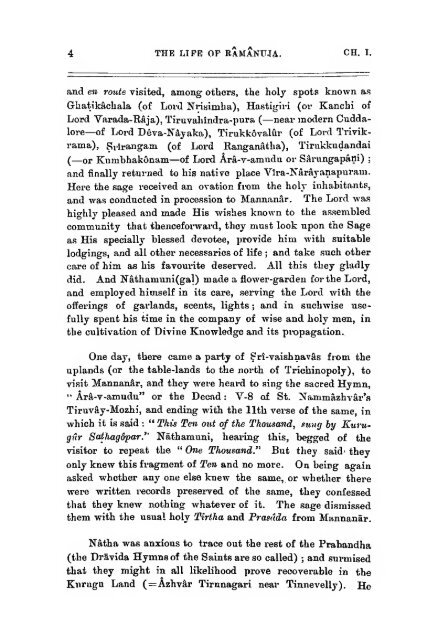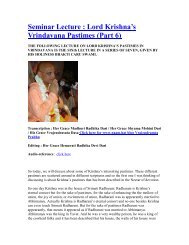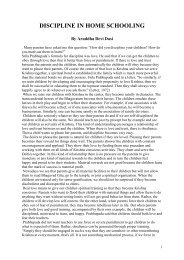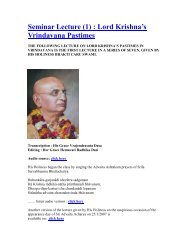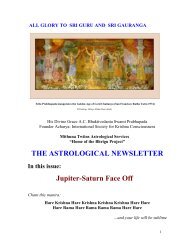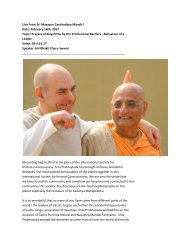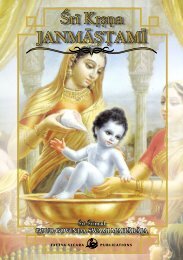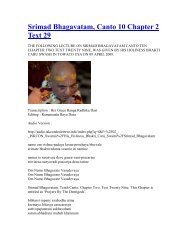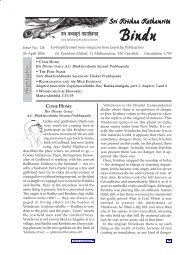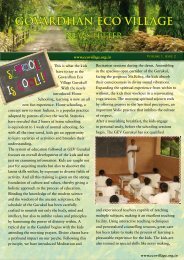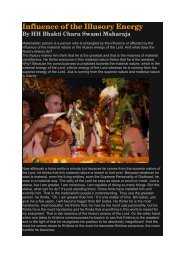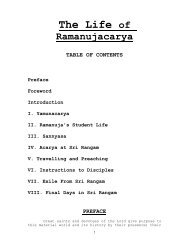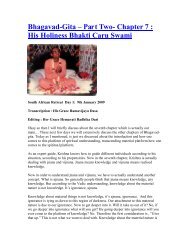the exponent of the Visishtadvaita philosophy - ebooks - ISKCON ...
the exponent of the Visishtadvaita philosophy - ebooks - ISKCON ...
the exponent of the Visishtadvaita philosophy - ebooks - ISKCON ...
Create successful ePaper yourself
Turn your PDF publications into a flip-book with our unique Google optimized e-Paper software.
THE LIFE OF RAMANUJA. CH. I.<br />
and en mite visited, among o<strong>the</strong>rs, <strong>the</strong> holy spots known as<br />
Ghatikachala (<strong>of</strong> Lord Nrisimha), Hastigiri (or Kanchi <strong>of</strong><br />
Lord Varada-K-aja), Tiruvahindra-pura (—near modern Cuddalore—<strong>of</strong><br />
Lord Deva-Nayaka), Tii-ukkovalilr (<strong>of</strong> Lord Trivikrama),<br />
Srlrangam (<strong>of</strong> Loi'd Ranganatha), Tirukkudandai<br />
(—or Kumhhakonam—<strong>of</strong> Lord Ara-v-amudu or Sarungapani) ;<br />
and finally returned to his native place Vlra-Xarayanapuram.<br />
Here <strong>the</strong> sage received an ovation from <strong>the</strong> holy inhabitants,<br />
and was conducted in procession to Mannanar. The Lord was<br />
highly pleased and made His -wishes known to <strong>the</strong> assembled<br />
community that <strong>the</strong>nceforward, <strong>the</strong>y must look upon <strong>the</strong> Sage<br />
as His specially blessed devotee, provide him with suitable<br />
lodgings, and all o<strong>the</strong>r necessaries <strong>of</strong> life ; and take such o<strong>the</strong>r<br />
care <strong>of</strong> him as his favourite deserved. All this <strong>the</strong>y gladly<br />
did. And Nathamuni(gal) made a flower-garden fortbe Lord,<br />
and employed himself in its care, serving <strong>the</strong> Lord with <strong>the</strong><br />
<strong>of</strong>ferings <strong>of</strong> garlands, scents, lights ; and in suchwise usefully<br />
spent his time in <strong>the</strong> company <strong>of</strong><br />
wise and holy men, in<br />
<strong>the</strong> cultivation <strong>of</strong> Divine Knowledge and its pi-opagation.<br />
One day, <strong>the</strong>re came a party <strong>of</strong> Sri-vaishnavas from <strong>the</strong><br />
uplands (or <strong>the</strong> table-lands to <strong>the</strong> north <strong>of</strong> Trichinopoly), to<br />
visit Mannanar, and <strong>the</strong>y were heard to sing <strong>the</strong> sacred Hymn,<br />
" Ara-v-amudu" or <strong>the</strong> Decad : V-8 <strong>of</strong> St. Xammazhvar's<br />
Tirnv&y-Mozhi, and ending with <strong>the</strong> 11th verse <strong>of</strong> <strong>the</strong> same, in<br />
which it is said :<br />
" This Ten out <strong>of</strong> <strong>the</strong> Thousand, sung by Kurugitr<br />
Saihagopar.'^ Nathamuni, hearing this, begged <strong>of</strong> <strong>the</strong><br />
visitor to repeat <strong>the</strong> " One Tlwusand." But <strong>the</strong>y said' <strong>the</strong>y<br />
only knew this fragment <strong>of</strong> Ten and no more. On being again<br />
asked whe<strong>the</strong>r any one else knew <strong>the</strong> same, or whe<strong>the</strong>r <strong>the</strong>re<br />
were written records preserved <strong>of</strong> <strong>the</strong> same, <strong>the</strong>y confessed<br />
that <strong>the</strong>y knew nothing whatever <strong>of</strong> it. The sage dismissed<br />
<strong>the</strong>m with <strong>the</strong> usual holy Tirtha and Prasdda from Mannanar.<br />
Natha was anxious to trace out <strong>the</strong> rest <strong>of</strong> <strong>the</strong> Prabandha<br />
(<strong>the</strong> Dravida Hymns <strong>of</strong> <strong>the</strong> Saints are so called) ; and surmised<br />
that <strong>the</strong>y might in all likelihood prove recoverable in <strong>the</strong><br />
Kurugn Land (=Azhvar Tirnnagari near Tinnevelly). He


